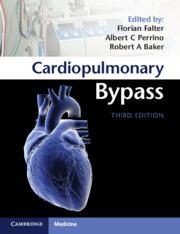Book contents
- Cardiopulmonary Bypass
- Cardiopulmonary Bypass
- Copyright page
- Contents
- Contributors
- Foreword
- Chapter 1 Human Factors and Teamwork in Cardiac Surgery
- Chapter 2 Equipment for Cardiopulmonary Bypass
- Chapter 3 Monitoring during Cardiopulmonary Bypass
- Chapter 4 Cardiopulmonary Bypass Circuit Setup and Safety Checks
- Chapter 5 Priming Solutions for Cardiopulmonary Bypass Circuits
- Chapter 6 Anticoagulation for Cardiopulmonary Bypass
- Chapter 7 Conduct of Cardiopulmonary Bypass
- Chapter 8 Minimal Invasive Extracorporeal Circulation
- Chapter 9 Considerations for Operations Involving Deep Hypothermic Circulatory Arrest
- Chapter 10 Metabolic Management during Cardiopulmonary Bypass
- Chapter 11 Myocardial Preservation during Cardiopulmonary Bypass
- Chapter 12 Weaning from Cardiopulmonary Bypass
- Chapter 13 Intraoperative Mechanical Circulatory Support and Other Uses of Cardiopulmonary Bypass
- Chapter 14 Mechanical Circulatory Support
- Chapter 15 Cardiopulmonary Bypass for Pediatric Cardiac Surgery
- Chapter 16 Coagulopathy and Hematological Disorders Associated with Cardiopulmonary Bypass
- Chapter 17 Inflammation and Organ Damage during Cardiopulmonary Bypass
- Chapter 18 Neuromonitoring and Cerebral Morbidity Associated with Cardiopulmonary Bypass
- Chapter 19 Renal Morbidity Associated with Cardiopulmonary Bypass
- Chapter 20 Common and Uncommon Disasters during Cardiopulmonary Bypass
- Index
- References
Chapter 5 - Priming Solutions for Cardiopulmonary Bypass Circuits
Published online by Cambridge University Press: 24 October 2022
- Cardiopulmonary Bypass
- Cardiopulmonary Bypass
- Copyright page
- Contents
- Contributors
- Foreword
- Chapter 1 Human Factors and Teamwork in Cardiac Surgery
- Chapter 2 Equipment for Cardiopulmonary Bypass
- Chapter 3 Monitoring during Cardiopulmonary Bypass
- Chapter 4 Cardiopulmonary Bypass Circuit Setup and Safety Checks
- Chapter 5 Priming Solutions for Cardiopulmonary Bypass Circuits
- Chapter 6 Anticoagulation for Cardiopulmonary Bypass
- Chapter 7 Conduct of Cardiopulmonary Bypass
- Chapter 8 Minimal Invasive Extracorporeal Circulation
- Chapter 9 Considerations for Operations Involving Deep Hypothermic Circulatory Arrest
- Chapter 10 Metabolic Management during Cardiopulmonary Bypass
- Chapter 11 Myocardial Preservation during Cardiopulmonary Bypass
- Chapter 12 Weaning from Cardiopulmonary Bypass
- Chapter 13 Intraoperative Mechanical Circulatory Support and Other Uses of Cardiopulmonary Bypass
- Chapter 14 Mechanical Circulatory Support
- Chapter 15 Cardiopulmonary Bypass for Pediatric Cardiac Surgery
- Chapter 16 Coagulopathy and Hematological Disorders Associated with Cardiopulmonary Bypass
- Chapter 17 Inflammation and Organ Damage during Cardiopulmonary Bypass
- Chapter 18 Neuromonitoring and Cerebral Morbidity Associated with Cardiopulmonary Bypass
- Chapter 19 Renal Morbidity Associated with Cardiopulmonary Bypass
- Chapter 20 Common and Uncommon Disasters during Cardiopulmonary Bypass
- Index
- References
Summary
The composition of the fluid used to prime cardiopulmonary bypass (CPB) circuits has been a source of great interest and debate ever since the inception of cardiopulmonary bypass in 1953. There has been significant progress in our understanding, but the ideal priming solution has still to be agreed upon and practice continues to vary widely between cardiac units. Circuits must be carefully de-aired with a compatible priming solution in order to prevent gas emboli from passing into the patient’s circulation at the commencement of CPB. Crystalloid and colloid priming solutions are now commonplace.
Keywords
- Type
- Chapter
- Information
- Cardiopulmonary Bypass , pp. 42 - 48Publisher: Cambridge University PressPrint publication year: 2022

